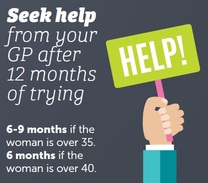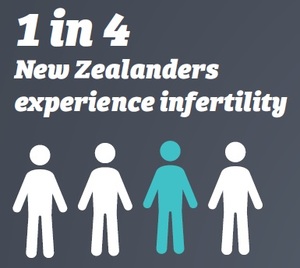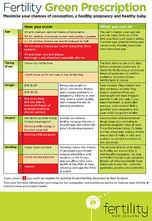Trouble conceiving?
No luck so far? If you’ve been trying to conceive for a while with no luck, or have a medical condition which impacts fertility, you might want to look at the next options for making a baby. This can be incredibly daunting and stressful. Often, coming to terms with the reality that making a baby isn’t as easy as you imagined has its own grief attached.
If you already have a child or children and are having difficulty conceiving, see our page on Secondary Infertility.
We recommend that you take as much control as possible, and have a plan.
- You’re able to check all the lifestyle boxes. You can identify the fertile window and you feel confident about your general health. Even if you are years into a fertility journey, this information is essential!
- If you have been trying to conceive for 12 months (9 months if the woman is over 35, and 6 months if the woman is over 40), see your GP for preliminary tests
- If you meet the eligibility criteria, your GP can refer you for a consultation with a fertility specialist, or you can make a private appointment
- You are considering, or undergoing fertility treatment
A starting point
If you are concerned about trying to start a family, or if you have a child and are having difficulty conceiving a second time, below are some suggestions that may help you during the ‘getting answers’ process.
- Take a list of questions with you to your health professional, and write down the answers. (Sometimes your anxiety about the cause of your infertility can cause you to forget what you wanted to ask, or what the answers were.)
- Ensure you are referred to a Reproductive Health Specialist or Clinic when necessary; they have specific experience in fertility treatment.
- Ask for copies of all your test results, and keep them in a folder at home, as there may come a time when you may need a copy of the information.
- Ask your doctor to explain what the tests and the results mean.
- Ask your specialist to keep your GP filled in on what is happening.
- Try to be assertive, and let your GP or Specialist know honestly how concerned you are.
- Seek out information for yourself – join FertilityNZ! Self-knowledge assists you to help yourself and understand more fully what is happening.
- Ask your GP to organise blood tests and sperm tests for you and your partner, BEFORE you are referred to the specialist. These need to be no more than 6 months old, and current results will save you time.
- Adjust lifestyle to optimise general and reproductive health.
The rollercoaster of infertility
It may have come as an initial surprise to you on your fertility journey that there can be extreme highs – or moments of hope and optimism; which can quite quickly swing to feelings of deep sadness, despair, or even depression. This is often tied into treatment cycles or even your monthly period. Events in your personal life – such as news of a friend or family member’s pregnancy, can also be a very tough part of dealing with what people often describe as the rollercoaster of emotions. Infertility is perhaps one of life’s hardest tests of resilience. In order to be able to bounce back and keep trying to conceive for as long as you feel is right for you to do so, it’s important to learn about and practice self-care. This means finding the things that help you to feel looked after both physically and emotionally so that the highs and lows of the roller coaster will be more manageable. Click here to read more about coping strategies.
Myths about Infertility
Just relaxing or taking a holiday will ‘cure’ infertility
- For 80% of couples there is a proven medical cause; just relaxing or taking a holiday will not cure the problem.
Stress causes infertility
- It is unproven that stress causes infertility, but there is plenty of evidence to suggest that fertility problems cause stress.
Reminding people of the difficulties of childrearing will help them feel better
- Most couples are aware of the challenges of parenting, such as sleepless nights and loss of leisure time, but have decided that becoming parents is more important. Suggesting that they are in some way ‘lucky’, though well-intentioned, can be seen as not understanding their distress, being patronising or even insulting.
Treatment for delayed fertility is always successful
- Although modern treatment is successful for a number of people, repeated cycles of treatment may be needed. Sadly, in some cases treatment will not be successful.
Adopt and you will conceive naturally
- A number of research projects have looked into the phenomenon of couples having a naturally conceived baby following an adoption. It has been found that couples who don’t adopt have the same chance of conceiving naturally as couples who do adopt.
Talking about fertility problems can help
One of the greatest ways to deal with infertility is to talk about it. This is not always easy or comfortable. At some point during infertility treatment, or investigation, you may experience a state of crisis.
This crisis in turn, may lead to feelings of isolation and despair. This can place a strain on your relationship. You may also feel alone and not have people to talk to who understand the experience of infertility. Due to the private nature of infertility, it is difficult to know who to contact.
All New Zealand fertility clinics have trained counsellors, and you do not need to be a patient of the clinic to make an appointment with a counsellor there. Fertility NZ exists to help you - call 0800 333 306 for guidance and support, or check out a group near you
Common causes of infertility
MEN (approx. 40%)
Male fertility problems can be caused by abnormalities in sperm numbers, movement or shape. However, the causes of many sperm problems remain unknown.
Causes could be:
- Failed vasectomy reversal
- Retrograde ejaculation
- Blocked ducts
- Varicocele
- Absence of vas deferens
- Undescended testes in childhood
- Autoimmune (antibody) disorders
- Lifestyle choices which impact sperm morphology
WOMEN (approx. 40%)
Female fertility problems commonly include:
- Tubal problems
- Endometriosis
- Disorders of ovulation
- Polycystic ovarian disease
- Frequent miscarriage
- Hormonal problems
- Autoimmune (antibody) disorders
- Recurrent genito-urinary infections
Unexplained infertility
Up to 20% of couples (including those experiencing secondary infertility) will have no explainable cause for their infertility.
There is rarely a quick or simple answer to infertility problems. Infertility is not something you catch and in most cases, is not preventable.
Infertility - the hard facts
- A couple is regarded as having a fertility problem when they have not conceived after 12 months of regular unprotected sexual intercourse.
- Infertility will affect 26% of New Zealanders at some stage of their life.
- Infertility is not just a female problem – in about 40% of infertile couples the problem is a female factor, in about 40% it is a male one and for the remaining 20% there is a joint problem, or the cause is unknown.
Funding
Requirements for publicly funded treatment differ slightly by District Health Board, but these criteria include:
- The couple have been trying to conceive for at least twelve months (for single people and same-sex couples, refer to ‘Making Babies with Donors and Surrogates’)
- If there is no diagnosed reason for infertility (‘unexplained infertility’), the couple must have been trying to conceive for four years
- Woman’s age 39 or less at time of consultation
- Woman’s BMI 32 or less
- Woman must be a non-smoker (at least three months prior to application)
- NZ citizenship, residency or visa of at least two years’ in duration (for both partners)







